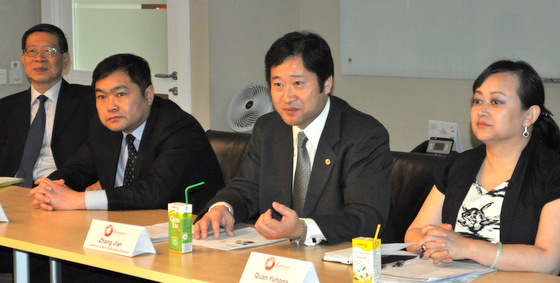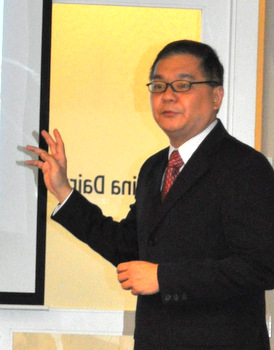 At yesterday's media briefing (L-R): Ngiam Zee Moey, an independent director of the company since 2005; general manager Hou Lei, seconded from SDIC Zhonglu; chairman Zhang Jian, concurrently executive deputy GM of SDIC Zhonglu; and executive director Quan Yuhong, concurrently CFO of SDIC Zhonglu. Photo by Tang Yibing
At yesterday's media briefing (L-R): Ngiam Zee Moey, an independent director of the company since 2005; general manager Hou Lei, seconded from SDIC Zhonglu; chairman Zhang Jian, concurrently executive deputy GM of SDIC Zhonglu; and executive director Quan Yuhong, concurrently CFO of SDIC Zhonglu. Photo by Tang YibingANOTHER S-chip is being revived after a lengthy period of suspension from trading.
This comes after a white knight rescue, as was the case with the former Asia Water and Sino Environment, which encountered debt, accounting and/or corporate governance issues.
The former New Lakeside Holdings, now known as Zhongxin Fruit & Juice, will resume trading this morning after being suspended for more than two years.
At the last done stock price of 2 Singapore cents, its market cap is S$20 million, which makes it a micro-cap. It has about 1 billion shares outstanding, of which 53% is held by the white knight, SDIC Zhonglu Fruit Juice Co.
SDIC was already a major shareholder before New Lakeside ran into problems. Back in 2008, SDIC had bought a 24.57% stake, or 98 million shares, for 12.5 cents apiece, or S$12.25 million in total.
Here are 10 takeaways from the media briefing yesterday helmed by three senior management executives of Zhongxin Fruit & Juice who hail from SDIC Zhonglu (see picture caption above).
Rescue and restore:
1. SDIC Zhonglu injected cash of RMB47.0 million in the 4Q of last year to repay loans owing by the company to several banks and individuals. In return, SDIC received 462.6 million new shares based on 2 cents a share.
2. Zhongxin now has net asset of RMB55 million, RMB30 million in cash and RMB30 million in bank borrowings. Its Net Asset Value is RMB5.2 cents, or 1 Singapore cent, a share.
Stabilise and grow:
3. To get Zhongxin's business quickly back on its feet, SDIC is using its global sales network to distribute Zhongxin's products, mainly apple juice concentrate. Zhongxin pays SDIC a commission of US$10 per tonne of products sold.
4. For 1HFY2013, Zhongxin reported RMB98 million in revenue and RMB16.4 million in net profit. The results were achieved mostly in 4Q after production was resumed. Note that the net profit was boosted by about RMB10 million in write-backs.
5. Gross profit margin was 18%.
6. According to Zhongxin chairman Zhang Jian, the revenue in the second half of the financial year would not be significantly different from the first half as apple juice concentrate is sold throughout the year and has a shelf-life of up to two years.
How it works on the ground:
 El Lee, an associate director of Financial PR, giving a presentation on Zhongxin.
El Lee, an associate director of Financial PR, giving a presentation on Zhongxin. Photo by Tang Yibing7. Zhongxin has two 100%-owned production facilities where China's apple growing is most concentrated: Xuzhou and Yuncheng. It has a 50% equity interest in a third facility in Linyi.
8. Zhongxin buys apples from family-owned orchards, which are predominant in China unlike large-scale commercial orchards found in the West. The apples are harvested and processed mainly from August to December.
Apple juice concentrate is sold to end-customers such as Nestle, The Coca Cola Company, PepsiCo and supermarkets in developed countries in North America, Europe and Japan and South Korea.
During the 1H of the calendar year, the factories are put to work producing vegetable and other fruit juices -- a norm in the industry.
9. The incumbents in the apple juice production industry are spared new competition as the Chinese government has stopped issuing licences for new apple juice production lines.
More on the white knight:
10. SDIC has been listed on the Shanghai Stock Exchange since 2004. It has a market cap of about RMB1.9 billion and trades at a PE of 55X. SDIC is in a similar business as Zhongxin: It produces a variety of fruit juice concentrate, including apple juice, pear juice and plum juice. FY2011 revenue and net profit were RMB1.1 billion and RMB45 million, respectively.
SDIC's exports make up about 10% of the global fruit juice concentrate market.
SDIC's controlling shareholder is China's largest state-owned investment holding company, the State Development & Investment Corporation. This fact should give some comfort to investors who are concerned about corporate governance issues.


